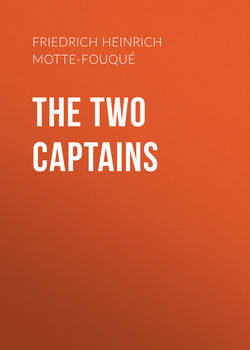Читать книгу The Two Captains - Friedrich Heinrich Karl de La Motte-Fouqué - Страница 3
CHAPTER III
ОглавлениеHe was not long in seeking the bright star, which he indeed felt was destined henceforth to guide the course of his whole life. The delicate form approached him not far from the entrance; weeping softly, it seemed to him, in the light of the full moon which was just rising, and yet smiling with such infinite grace, that her tears were rather like a pearly ornament than a veil of sorrow. In deep and infinite joy and sorrow the two lovers wandered silently together through the flowery groves; now and then a branch waving in the night-air would touch the guitar on the lady’s arm, and it would breathe forth a slight murmur which blended with the song of the nightingale, or the delicate fingers of the girl would tremble over the strings and awaken a few scattered chords, while the shooting stars seemed as if following the tones of the instrument as they died away. Oh, truly happy was this night both to the youth and the maiden, for no rash wish or impure desire passed even fleetingly across their minds. They walked on side by side, happy that Providence had allowed them this delight, and so little desiring any other blessing that even the transitoriness of that they were now enjoying floated away into the background of their thoughts.
In the middle of the beautiful garden there was a large open lawn, ornamented with statues and surrounding a beautiful and splashing fountain. The two lovers sat down on its brink, now gazing at the waters sparkling in the moonlight, and now delighting in the contemplation of each other’s beauty. The maiden touched her guitar, and Heimbert, impelled by a feeling scarcely intelligible to himself, sang the following words to it:
“There is a sweet life linked with mine,
But I cannot tell its name;
Oh, would it but to me consign
The secret of that life divine,
That so my lips in whispers sweet
And gentle songs might e’en repeat
All that my heart would fain proclaim!”
He suddenly paused, and blushed deeply, fearing he had been too bold. The lady blushed also, touched her guitar-strings with a half-abstracted air, and at last sang as if dreamily:
“By the spring where moonlight’s gleams
O’er the sparkling waters pass,
Who is sitting by the youth,
Singing on the soft green grass?
Shall the maiden tell her name,
When though all unknown it be,
Her heart is glowing with her shame,
And her cheeks burn anxiously,
First, let the youthful knight be named.
‘Tis he that on that glorious day
Fought in Castilla’s proud array;
‘Tis he the youth of sixteen years,
At Pavia, who his fortunes tried,
The Frenchman’s fear, the Spaniard’s pride.
Heimbert is the hero’s name,
Victorious in many a fight!
And beside the valiant knight,
Sitting in the soft green grass,
Though her name her lips shall pass,
Dona Clara feels no shame ”
“Oh!” said Heimbert, blushing from another cause than before, “oh, Dona Clara, that affair at Pavia was nothing but a merry and victorious tournament, and even if occasionally since then I have been engaged in a tougher contest, how have I ever merited as a reward the overwhelming bliss I am now enjoying! Now I know what your name is, and I may in future address you by it, my angelic Dona Clara, my blessed and beautiful Dona Clara! But tell me now, who has given you such a favorable report of my achievements, that I may ever regard him with grateful affection?”
“Does the noble Heimbert of Waldhausen suppose,” rejoined Clara, “that the noble houses of Spain had none of their sons where he stood in the battle? You must have surely seen them fighting by your side, and must I not have heard of your glories through the lips of my own people?”
The silvery tones of a little bell sounded just then from a neighboring palace, and Clara whispered, “It is time to part. Adieu, my hero!” And she smiled on the youth through her gushing tears, and bent toward him, and he almost fancied he felt a sweet kiss breathed from her lips. When he fully recovered himself Clara had disappeared, the morning clouds were beginning to wear the rosy hue of dawn, and Heimbert, with a heaven of love’s proud happiness in his heart, returned to his watchful friend at the garden gate.
